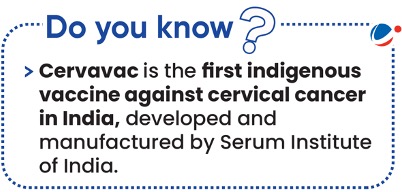Why in the news?
First ever Global Cervical Cancer Elimination Forum took place in Colombia, recently.
More on News
- It was organised by WHO, World Bank, UNICEF, Bill & Melinda Gates Foundation and others.
- Forum aims to catalyse governments, donors, civil society, and various stakeholders to commit to cervical cancer elimination and galvanize global community.
About Cervical Cancer
- Cancer is a disease in which cells in the body grow out of control. When cancer starts in the cervix, it is called cervical cancer.
- The cervix connects the vagina (birth canal) to the upper part of the uterus (or womb where a baby grows during pregnancy).
- It occurs most often in women over age 30 and is the fourth most common cancer in women globally.
- It is the second most common cancer among females in India.
- Main cause of cervical cancer is the persistent infection with the human papillomavirus (HPV).
HPV Types
|
About HPV
- HPV is a common sexually transmitted infection which can affect the skin, genital area and throat.

- In most cases the immune system clears HPV from the body.
- Persistent infection with high-risk HPV can cause abnormal cells to develop, which go on to become cancer.
 There is currently no treatment for HPV infection.
There is currently no treatment for HPV infection.
HPV vaccination and other prevention steps
- There are 6 HPV vaccines available globally. All protect against the high-risk HPV 16 and 18, which cause most cervical cancers.
- HPV vaccines (1 or 2 doses) should be given to all girls aged 9–14 years.
- Screening, every 5-10 years, from the age of 30 (25 years in women living with HIV) can detect cervical disease, which when treated, also prevents cervical cancer.
- Early detection followed by prompt quality treatment. There is no treatment for the virus itself. However, there are treatments for the health problems that HPV can cause like Cervical Cancer.
Initiatives for prevention
- Cervical Cancer Elimination Initiative (by World Health Organization): WHO has outlined the ‘90-70-90’ targets for each country by 2030-
- Vaccination: 90% of girls fully vaccinated with the HPV vaccine by the age of 15;
- Screening: 70% of women screened by the age of 35, and again by the age of 45;
- Treatment: 90% of women with pre-cancer treated and 90% of women with invasive cancer managed.
- Vaccination to prevent Cervical Cancer: Union Government in India proposed it in Interim Budget 2024-25. The programme will be for girls in the age group of 9 to 14 years for prevention of cervical cancer.






